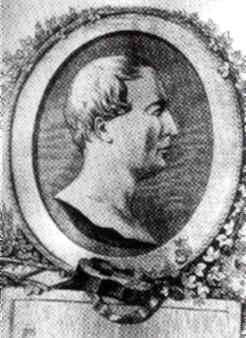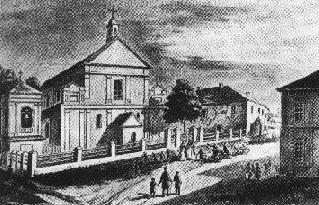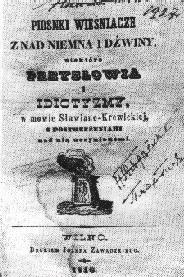![]()

Jan Chachot was born in the village of Maliushychy near
Dominican School and Church in Navahradak
in the first half of the 19th century
 When time has come, Jan Chachot entered the Dominican School in
Navahradak. There he made friends with his classmate, future great Polish poet with world
name Adam Mickiewicz. Two friends were not satisfied with scholastic sciences that
catholic priests were teaching them with the aid of whipping. They would often leave musty
and obscure corridors of the school and go to the scope where real life was whirling with
its astonishing contrasts and contradictions, its troubles and joys; where people’s
concerns and interests were very far from those that two friends were reading in the books
about. The two young people gifted with kind hearts and compassionable souls were looking
at common people with respect and sympathy. They were very anxious to study common
people’s life, their customs, rites, and believes. Especially they were attracted by
the oral poetry of the Belarusian peasantry.
When time has come, Jan Chachot entered the Dominican School in
Navahradak. There he made friends with his classmate, future great Polish poet with world
name Adam Mickiewicz. Two friends were not satisfied with scholastic sciences that
catholic priests were teaching them with the aid of whipping. They would often leave musty
and obscure corridors of the school and go to the scope where real life was whirling with
its astonishing contrasts and contradictions, its troubles and joys; where people’s
concerns and interests were very far from those that two friends were reading in the books
about. The two young people gifted with kind hearts and compassionable souls were looking
at common people with respect and sympathy. They were very anxious to study common
people’s life, their customs, rites, and believes. Especially they were attracted by
the oral poetry of the Belarusian peasantry.
In 1815 Jan Chachot and Adam Mickiewicz left Navahradak for Vilna (nowadays Vilnius) where they applied for stipend to study in the Vilna University. However, only Adam Mickiewicz obtained the financial support. Jan had to postpone his study and started to look for a job. First he had a low-wage assistantship with Vilna lawyers, and then he obtained the position of a secretary in special commission for cataloguing archives of the Radzivils - the Belarusian noble family. A year later Jan Chachot finally realized his dream. He became a student of the Vilna University. He entered the department of moral and political sciences with the aim to become a lawyer. He always had with him the Statut of the Great Duchy of Lithuania (Statut Vyalikaga Knyazstva Litovskogo) .
Energetic by his nature Jan Chachot could not hide himself behind piles of books and not participate in the social life. That was the time of augmenting political movement against tsarist autocracy and serfdom. Proclaimed by the Great French revolution slogans of freedom, equality, and brotherhood were enthusiastically met by the advanced social circles of multinational Russian Empire. In 1817 a clandestine organization of the Vilna University students called “Association of Philomates (Lovers of Sciences)” was established. Jan Chachot did not hesitate to join the association, and he took an active part in its activities. Together with his colleagues (Tamash Zan, Adam Mickiewicz, Juzaf Jazhouski, Anufryj Pietrashkievich, Francishak Malieuski, Mikhal Rukievich, Juzaf Kavalieuski, Ihnat Damiejka and others) he was doing his best in uniting socially active part of Belarusian youth. Jan Chachot headed the literature section of the association. He would often present his own literary works, discuss the works of his friends, overview latest publications.
Talking about Philomates period of the Chachot’s life it is necessary to mention that he helped Adam Mickiewicz in editing and publishing his poems. At that time Mickiewicz was working as a teacher in Kouna (nowadays Kaunas), and he could not come to Vilna. Jan Chachot scrupulously read Mickiewicz’s poems and proposed many change, some of which the author accepted. Today we read many poems of the great Mickiewicz with Chachot’s changes in them.
Since all unofficial organizations were banned by tsarist government it was very dangerous to be enrolled in them. In 1823 the “Association of Philomates” was disclosed by tsarist authorities. About 100 its members were thrown into jail, and the inquiry was conducted until April, 1824. After the investigation had been finished many members of the clandestine organization were exiled to remote regions of the Russian Empire. Three the most active members - Tamash Zan, Jan Chachot, and Adam Suzin - were punished most severely. They were banned to Ural (almost Siberia) and imprisoned there. Jan Chachot spent 1/2 year in the fort of Kizil. Then he was moved to Ufa. In 1830 he could come to Moscow. In 1833 finally he was allowed, under police supervision, to return to his native Belarus. He found a job in Liepiel in the administration of the Biarezina water channel. In Liepiel he began to collect folk songs. Only in 1839 the Russian emperor “lorded over” to let Jan Chachot go home to Navagradak, and the poet was not subject to police supervision any more. The health of Chachot was in very bad conditions after years of exile and imprisonment. In Shchorsy, near Navahradak, Jan Chachot got the position of a librarian in a very rich library of a liberal count Khraptovich who used to favor the Philomates. After the count had died in 1844 Jan Chachot was living at his friends’ in villages Bortniki, Volnaja, and Dalmataushchyna near Navahradak. He was collecting and publishing Belarusian falk songs and poems.
Aggravating health conditions made Chachot go to the spa of Druskieniki (Druskieninskaj today). Unfortunately, the treatment was not effective, and in August 23, 1847 Jan Chachot died. He was buried on the cemetery of the village Rotnitsa near Druskieniki. Ten years after the poet’s death his friends set up a monument on his grave.
Majority of his poems Jan Chachot wrote in Polish. Because of Polish ascendancy on Belarusian territory Polish was considered as a noble, high-rank language. All Belarusian aristocrats were speaking this language while Belarusian was the language of common people. As a typical representative of polonized low-rank Belarusian nobility Jan Chachot was educated in Polish. However, unlike other people of his circle he respected the language of his ancestors and common peasantry. He did not regard it as a low-rank language.
First known Chachot’s literary works appeared in 1818 and were connected with student Philomates life. Almost every Philomates session was coloured by Jan’s songs often written on Belarusian folk motives. Many songs have reflected his antigovernment mood, the author’s love for freedom. The most successful among students were songs and poems written in Belarusian. Most of the students were coming from polonized Belarusian nobility and the language of deprived of civil rights common people was very dear to them.
The songs and poems of Jan Chachot that lived till our days, be they either in Belarusian or in Polish, demonstrate the marvelous talent of a song-writer. Euphony and sincerity of Chachot’s poems let them be easily set to music. For example, Philomates and all Vilna youth liked very much Jan Chachot’s song “Old are so crazy” written in 1818-19 and set to the motive of the Belarusian falk song “Why the girl is not loved if the girl is nice.”
The rout of the students “Association of Philomates” whose member Chachot was and the consequent imprisonment did not make the poet stop writing poems. While being injailed and waiting for exile to Siberia Jan wrote a song in Belarusian “Wild gooses fly, we’ll go to far Russia”. The song was telling about gooses flying South while the sentenced will be transported North, and nobody knows whether they will ever return. Unfortunately, the exact version of the song did not live till our days. Did not live till our days either a play in honor of Adam Mickiewicz written in Belarusian. Definitely, Belarusian songs and poems by Chachot had some drawbacks if measured by contemporary literary standards. Though it is necessary to account for the fact that Jan Chachot was a pioneer in New Belarusian literature. Jan Chachot’s language, not numerous words of Polish origin being omitted, does not differ too much from contemporary Belarusian literary language. His language is quite rich, flexible, huefull. Chachot had rich folk language at his disposal to enrich his own language.
In the Chachot’s Belarusian literary works one can see expressive attributes of that time, some features of that time Belarusian village, its social structure. Common people are presented very vividly. Though they are not educated they can express themselves appropriately. Chachot’s characters are concerned about the destiny of oppressed Belarusian language. In the majority of his poems the author tried to pacify nobility and peasantry. He addressed landowners so that they love they peasants, care about them, and the God will reward. Peasants in their turn were taught to obey their masters, not to exaggerate with alcohol. The poems of such kind revealed the so called class solidarity in face of the aggressive policy of tsarist autocracy.
Very interesting part of the Chachot’s literary heritage comprise ballads written in 1818-1819 in Polish; eight of them lived till our days. The subjects of the ballads were taken from Belarusian folk legends. Chachot’s ballads written in a vivid way are real literary chef d’oeuvres. The ballads influenced Adam Mickiewicz who then switched from classicism to romanticism using the the folk heritage in his poems.
Among Chachots poems and songs one should mention those dedicated to Zosia Malieuskaja - the poet’s love though Zosia did not respond with mutual feelings. She was a talented singer and often would sing in piano accompaniment. Jan was writing especially for her song texts using Belarusian falk motives. More than 100 of such songs Chachot wrote in prison. The target of Jan’s love wanted to support her admirer and was writing to him tender letters. This compassion was giving the poet the second breath, and he was writing couple of songs per day. Written sincerely, a little bit sentimentally, these songs cannot help moving the reader.
Very interesting in many aspects are
“The Tales about Ancient Licvins till the year of 1434.” (Licvins are ancient Belarusians). During the Vilna period of his literary activity Jan Chachot was bearing the idea to rhyme the history of his native country. Exile and severe ordeals deterred the realization of the idea. Only in 1842-44, when he had returned from 20 years long exile, his dream came true and he wrote “The Tales about Ancient Licvins ...” The series of poems about famous ancestors is based on historical facts which the poet found in the “Chronicle of Poland, Lithuania, Zamojcija and Russia” by Maciej Stryjkouski and nine-volume “History of Lithuanian People” by Theodore Narbut. “The Tales about Ancient Licvins ...” present the history of ancient Belarus in vivid images and interestingly elucidate many historical events.Though Jan Chachot was a very talented and productive poet, he himself did not consider literature as the major occupation of his life. He saw his vocation in collecting and studying Belarusian folk heritage. In Belarusian folklore Jan Chachot is a first-rank star. He committed a real deed by having published during the period between 1837-1846 six books of the collected folk songs. By his publications he demonstrated to the world that Belarusian people have invaluable cultural heritage.
With big respect Jan Chachot treated the Belarusian language which he called Kryvichan. (Kryvichi is one of Slavonic tribes, ancestors of the Belarusian nation). The poet dreamed about grammar and fundamental dictionary of the Belarusian language. He regretfully noted that when other nations of Slavic origin have it “Kryvichan million people” nation got neither grammar nor a dictionary. He began to compile the dictionary of the most distinctive words and expressions of the Navahradak region. In his articles Jan Chachot presented detailed analysis of the Belarusian language features, revealed its main dialects.
Cover of the Book
"The Peasants Songs ..."
 The wish to develop the literary Belarusian language led Chachot to write in
Belarusian, to publish in this language. In the first half of the 19th century, after
secular silence, the Belarusian language, the language of deprived of civil rights
peasantry sounded from the pages of published by Chachot books. The two books by Chachot “Peasants
Songs from the Nieman and Dzvina Regions with Their Enlosed Original Versions in Slavonic
Kryvichan Language” (Vilna, 1846) and “Peasants Songs from the Nieman and
Dzvina Regions, Some Proverbs and Idioms in Slavonic Kryvichan Language, with Their
Analysis” (Vilna, 1846) marked the birth of the New Belarusian literature and the
beginning of the national renaissance of one of distinctive and great nations.
The wish to develop the literary Belarusian language led Chachot to write in
Belarusian, to publish in this language. In the first half of the 19th century, after
secular silence, the Belarusian language, the language of deprived of civil rights
peasantry sounded from the pages of published by Chachot books. The two books by Chachot “Peasants
Songs from the Nieman and Dzvina Regions with Their Enlosed Original Versions in Slavonic
Kryvichan Language” (Vilna, 1846) and “Peasants Songs from the Nieman and
Dzvina Regions, Some Proverbs and Idioms in Slavonic Kryvichan Language, with Their
Analysis” (Vilna, 1846) marked the birth of the New Belarusian literature and the
beginning of the national renaissance of one of distinctive and great nations.
Jan Chachot mastered many European languages (French, German, English, Latin, Polish, Russian) but till his last days he remained faithful to his Belarusian nation, its culture and language. All Chachot’s works, be they either in Polish or Belarusian, are Belarusian in their spirit. His works demonstrated that Chachot is a great Belarusian national poet.
Chachot Jan "Vybranyja Tvory"/ Uklad., pier. z pol'skaha ,
pradm. i kamient. K. Cvirki, Minsk.: MF "Bielaruski Knihazbor", 1996.
[Chachot Jan "Selected Works," Prepared by K. Cvirka, Minsk,
International Foundation "Belarusian Books Collection," 1996.]
 This file is a part of
the Virtual Guide to Belarus - a collaborative project
of Belarusian scientists and professionals
abroad. VG brings you the most extensive compilation of the information about Belarus on
the Web.
This file is a part of
the Virtual Guide to Belarus - a collaborative project
of Belarusian scientists and professionals
abroad. VG brings you the most extensive compilation of the information about Belarus on
the Web.
Please send your comments to the authors of VG to
Belarus
History | Statehood | Culture | Law and
Politics | Cities | Nature and Geography |
©1994-04 VG to Belarus
Disclaimer